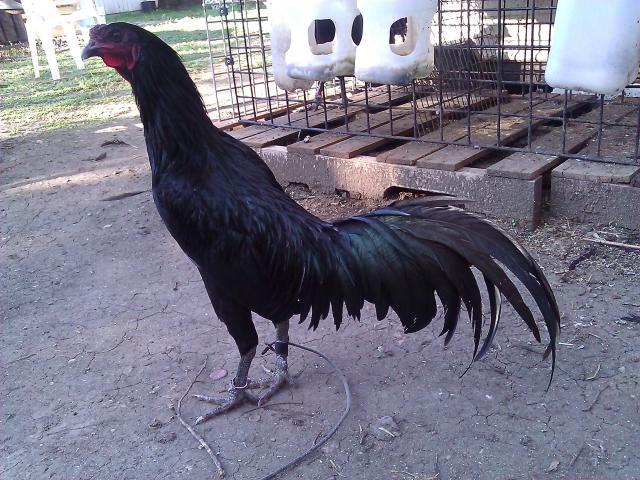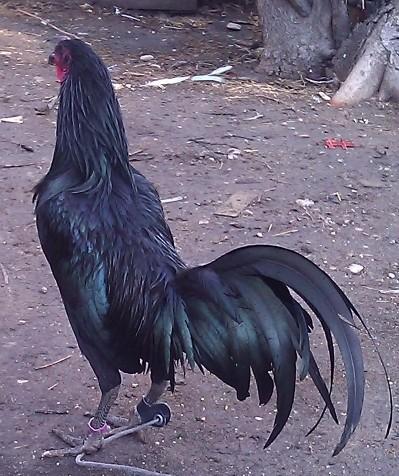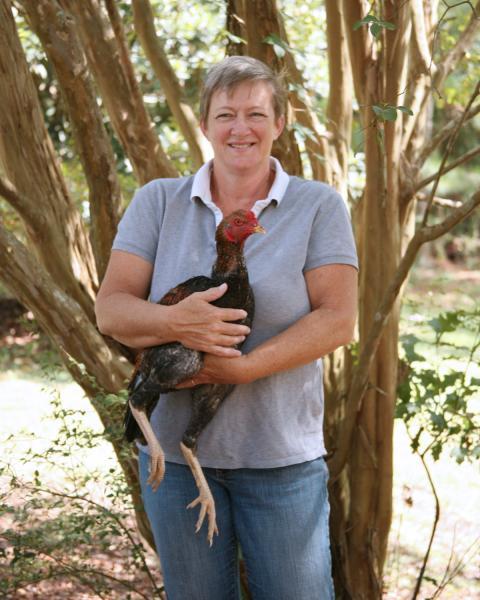Good questions, PC. My own experience is with a line of PR Spanish Games that I bred for years. Some would come rosecomb and some straight. I was always under the impression that, in most breeds, be they game or not, that rosecombs were dominant, but as I said, I got both from the same trio that spanned hundreds of progeny.......Pop
Navigation
Install the app
How to install the app on iOS
Follow along with the video below to see how to install our site as a web app on your home screen.
Note: This feature may not be available in some browsers.
More options
You are using an out of date browser. It may not display this or other websites correctly.
You should upgrade or use an alternative browser.
You should upgrade or use an alternative browser.
Show Off Your Games!
- Thread starter fowlafoot
- Start date
Thanks PrairieChicken,
The dominance of the rosecomb trait makes it easy to select against. If you carry even one copy of the allele, then you have a rosecomb. Thus rosecomb allele will not be able to hide like some other traits.
And if it is a mutation of the single comb, wouldn't it be recessive to the straight comb then?
The rosecomb allele, assuming there is only one, should always dominate comb type even if is derived from a line of single comb only birds. That is unless some other locus / gene must be at play allowing the rosecomb phenotype to be expressed. Something about one of my game lines when crossed into rosecombed dominiques screws up the rose comb in about half of the birds resulting from such a cross.
I still do not know if the rosecomb allele is at the same locus as the singlecomb allele. That might be important.
The dominance of the rosecomb trait makes it easy to select against. If you carry even one copy of the allele, then you have a rosecomb. Thus rosecomb allele will not be able to hide like some other traits.
And if it is a mutation of the single comb, wouldn't it be recessive to the straight comb then?
The rosecomb allele, assuming there is only one, should always dominate comb type even if is derived from a line of single comb only birds. That is unless some other locus / gene must be at play allowing the rosecomb phenotype to be expressed. Something about one of my game lines when crossed into rosecombed dominiques screws up the rose comb in about half of the birds resulting from such a cross.
I still do not know if the rosecomb allele is at the same locus as the singlecomb allele. That might be important.
Quote:
I am asking the expert above.

In respect to the gamefowl strain you have a photographed does it represent; the gamefowl source of the rosecomb allele found in all nongame breeds, an example of a gamefowl line with the rosecomb allele derived from nongame ancestors, or is it derived from a single-comb only line that spontaneously arose through mutation?
The bird is a rosecomb from a rosecomb gamefowl line. Some of the research I have located showed that some of the rosecomb spanish blood supposedly came from rosecomb gamefowl brought in from England that are no longer a gamefowl strain represented in England. Others suggest they may have also came by way of the Phonecians or Roman expansion, or any of the many trade routes from the Orient. Genetically speaking the rosecomb trait comes closest to being completely dominant compared to the other comb types as well as many of the overall genetic expressions of the fowl. This line through breedings in the brood pens proved to be quite homozygous for rosecomb in their pure matings. Only bred them a couple years though in small hen raised clutches so my percentages for genetic testing could have been better expressed and am only going off of my limited results. My questions would be to you all that being such a dominant representing trait, wouldn't one expect to see it cropping up in all breeds game and non game alike as somthing epressed so dominantly would be hard to breed out of a line after it gets into them? Wouldn't it not be likely that it is a trait bred in from a non game line as a loss in gameness of any kind by way of "barnyard" infusion supposedly kills the deadgameness that is bred for in true game fowl? And if it is a mutation of the single comb, wouldn't it be recessive to the straight comb then?
I sure hope someone with more knowledge than I can shed light on this as a recent grade project has recently peaked my interest in this topic. I am not sure but could it not be possible that there may be several allele involved the expression?
I am asking the expert above.

In respect to the gamefowl strain you have a photographed does it represent; the gamefowl source of the rosecomb allele found in all nongame breeds, an example of a gamefowl line with the rosecomb allele derived from nongame ancestors, or is it derived from a single-comb only line that spontaneously arose through mutation?
The bird is a rosecomb from a rosecomb gamefowl line. Some of the research I have located showed that some of the rosecomb spanish blood supposedly came from rosecomb gamefowl brought in from England that are no longer a gamefowl strain represented in England. Others suggest they may have also came by way of the Phonecians or Roman expansion, or any of the many trade routes from the Orient. Genetically speaking the rosecomb trait comes closest to being completely dominant compared to the other comb types as well as many of the overall genetic expressions of the fowl. This line through breedings in the brood pens proved to be quite homozygous for rosecomb in their pure matings. Only bred them a couple years though in small hen raised clutches so my percentages for genetic testing could have been better expressed and am only going off of my limited results. My questions would be to you all that being such a dominant representing trait, wouldn't one expect to see it cropping up in all breeds game and non game alike as somthing epressed so dominantly would be hard to breed out of a line after it gets into them? Wouldn't it not be likely that it is a trait bred in from a non game line as a loss in gameness of any kind by way of "barnyard" infusion supposedly kills the deadgameness that is bred for in true game fowl? And if it is a mutation of the single comb, wouldn't it be recessive to the straight comb then?
I sure hope someone with more knowledge than I can shed light on this as a recent grade project has recently peaked my interest in this topic. I am not sure but could it not be possible that there may be several allele involved the expression?
Last edited:
pride&joy :
I sure hope someone with more knowledge than I can shed light on this as a recent grade project has recently peaked my interest in this topic. I am not sure but could it not be possible that there may be several allele involved the expression?
I contemplated this while typing my first post, but the rosecomb "gene" is so dominant that it even effects things like bone structure when present. If it was expressed on several different loci, then I think you would more than likely see more variation in the incomplete dominant offspring. What could be effecting the variation in offspring is that there may be only one locus for rosecomb, but there is probably many different spots on the genetic code that effect comb and surrounding characteristics that corrupt the rosecomb expression. While rosecomb dominates, it could be possible that other less dominant factors corrupt the rosecombs outward expressions. Maybe skin type/color/thickness, bone structure, etc., etc, does just enough to corresponding structural characteristics that it disrupts the rosecomb expression. Bonestructure may be what is altering your cross centrarchid, of course it is hard telling when using American Games for projects, its like playing craps with a Yahtzee game with all the possibilities we have in our American Game lines
 . Thinking on the mutation still... wouldn't we see more sporadic rosecombs in non rosecomb lines if it was a mutated genetic anomaly?
. Thinking on the mutation still... wouldn't we see more sporadic rosecombs in non rosecomb lines if it was a mutated genetic anomaly?
I sure hope someone with more knowledge than I can shed light on this as a recent grade project has recently peaked my interest in this topic. I am not sure but could it not be possible that there may be several allele involved the expression?
I contemplated this while typing my first post, but the rosecomb "gene" is so dominant that it even effects things like bone structure when present. If it was expressed on several different loci, then I think you would more than likely see more variation in the incomplete dominant offspring. What could be effecting the variation in offspring is that there may be only one locus for rosecomb, but there is probably many different spots on the genetic code that effect comb and surrounding characteristics that corrupt the rosecomb expression. While rosecomb dominates, it could be possible that other less dominant factors corrupt the rosecombs outward expressions. Maybe skin type/color/thickness, bone structure, etc., etc, does just enough to corresponding structural characteristics that it disrupts the rosecomb expression. Bonestructure may be what is altering your cross centrarchid, of course it is hard telling when using American Games for projects, its like playing craps with a Yahtzee game with all the possibilities we have in our American Game lines

Quote:
You should be able to post pics blueface 3 posted pics here on the Game thread on his 2 post:
https://www.backyardchickens.com/forum/viewtopic.php?pid=7566772#p7566772
Go to the top and push the box with Img it will come up like this the click in the middle of the imgs (split the brackets with the cursor) and paste your url/ jpeg paste no spaces in between the brackets and the url.jpeg
Try it and see I don't know of any waiting game on here for posting pics.
 Anybody?
Anybody?
Jeff
Oh okay

well Grandaddy there ya go post away 6 more times and get after posting those pics-
 ( rules?
( rules?
 )
)
Jeff
You should be able to post pics blueface 3 posted pics here on the Game thread on his 2 post:
https://www.backyardchickens.com/forum/viewtopic.php?pid=7566772#p7566772
Go to the top and push the box with Img it will come up like this the click in the middle of the imgs (split the brackets with the cursor) and paste your url/ jpeg paste no spaces in between the brackets and the url.jpeg
Try it and see I don't know of any waiting game on here for posting pics.

Jeff
Oh okay

well Grandaddy there ya go post away 6 more times and get after posting those pics-


Jeff
Last edited:
My grey Asil, just posted some eggs on hatching egg section




gallo4319
Songster
- Jun 2, 2010
- 750
- 87
- 185
grade sumatra, little percent shamo.


I posted pictures of my first cross months back
this is the F2


I posted pictures of my first cross months back
this is the F2
Ish,
Look how big he's getting. He has started mounting the hen as well. Sometimes him and one of the hens will square off, face to face, and go at each other...never very serious but with a lot of neck feathers raised and some jumping at each other...is this courtship or deciding dominance?

sharon
Look how big he's getting. He has started mounting the hen as well. Sometimes him and one of the hens will square off, face to face, and go at each other...never very serious but with a lot of neck feathers raised and some jumping at each other...is this courtship or deciding dominance?

sharon
Quote:
Hi Sharon, nice looking stag. I take it you got him from our friend, Ish. The action you mentioned is a dominance thing. Usually an older hen will give a young fella a really hard time. He looks kinda young to be taking up for himself like that, so he must be a firey guy. The Shamo Lady, Julia Keeling, said it best. She said "they are like big puddings until they reach a certain age, then look out". I`ve got an old cock, named Popeye, who is fiesty, like your boy. Popeye got his name at a very young age when he lost his left eye as a result of sassing an old cock. If you haven`t owned oriental fowl before, you`re in for a special treat. Have fun........Pop
Hi Sharon, nice looking stag. I take it you got him from our friend, Ish. The action you mentioned is a dominance thing. Usually an older hen will give a young fella a really hard time. He looks kinda young to be taking up for himself like that, so he must be a firey guy. The Shamo Lady, Julia Keeling, said it best. She said "they are like big puddings until they reach a certain age, then look out". I`ve got an old cock, named Popeye, who is fiesty, like your boy. Popeye got his name at a very young age when he lost his left eye as a result of sassing an old cock. If you haven`t owned oriental fowl before, you`re in for a special treat. Have fun........Pop
New posts New threads Active threads
-
Latest threads
-
-
-
Chicken walking backward, as if a seizure
- Started by CocoBChick
- Replies: 4
-
Hello I am new to Backyard Chickens, but not unknown to Chickens
- Started by CocoBChick
- Replies: 9
-
-
-
Threads with more replies in the last 15 days
-
-
-
-
pollipazzi's 365 project
- Started by pollipazzi
- Replies: 112
-
BYC's 52-week Photography Challenge. Week 1: (Jan 5-11, 2026). Theme: SUNSET
- Started by azurbanclucker
- Replies: 100
-
×


